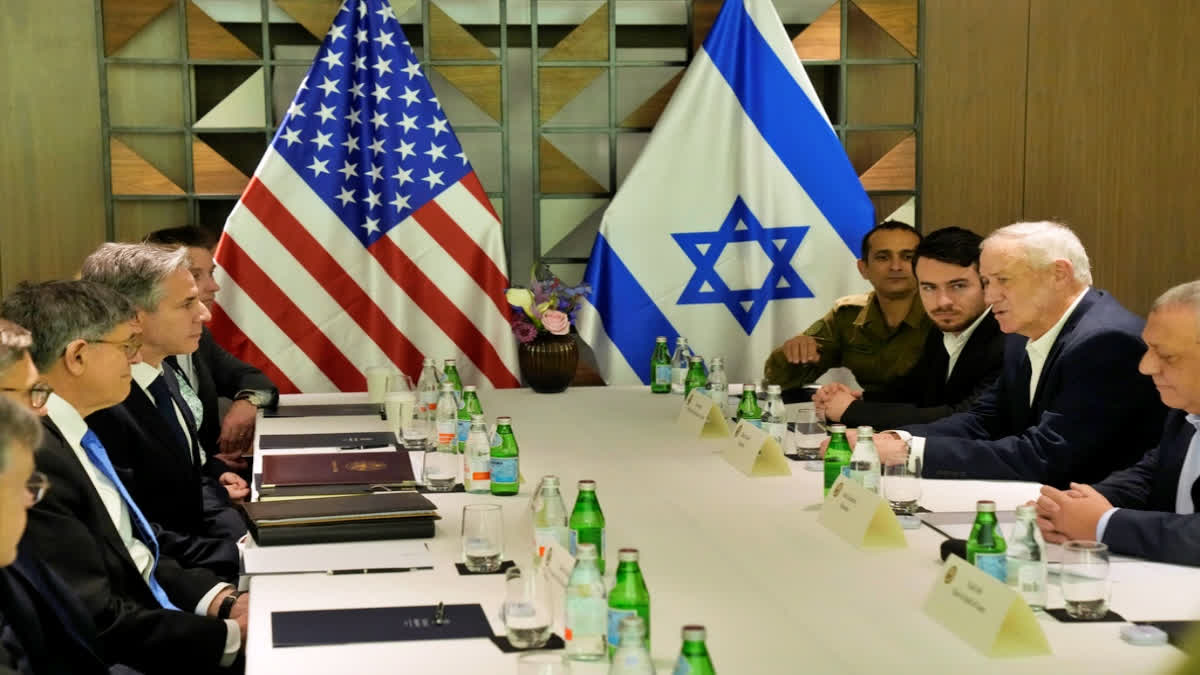Tel Aviv (Israel):U.S. Secretary of State Antony Blinken left the Middle East on Thursday with public divisions between the United States and Israel at perhaps their worst level since Israel’s war against Hamas in Gaza began in October.
Wrapping up a four-nation Mideast trip — his fifth to the region since the conflict erupted — Blinken was returning to Washington after getting a virtual slap in the face from Israeli Prime Minister Benjamin Netanyahu, who said the war would continue until Israel is completely victorious and appeared to reject outright a response from Hamas to a proposed cease-fire plan.
Relations between Israel and its main international ally, the United States, have been tense for months, but Netanyahu's public dismissal of a plan the U.S. says has merit, at least as a starting point for further negotiation, highlighted the divide.
Yet Blinken and other U.S. officials said they remained optimistic that progress could be made on their main goals of improving humanitarian conditions for Palestinians civilians, securing the release of hostages held by Hamas, preparing for a post-conflict Gaza and preventing the war from spreading.
Officials said Blinken’s optimism was based on his first four post-Oct. 7 trips to the Middle East. None of those visits resulted in immediate visible successes, but they brought limited but significant improvements in the delivery of humanitarian aid and a weeklong cease-fire in November in which scores of hostages were released.
“Clearly there are things that Hamas sent back that are absolute non-starters,” Blinken said of the response the militant group delivered Tuesday to a cease-fire and hostage release proposal that was endorsed last month by Egypt, Qatar, the U.S. and Israel itself.
“But, at the same time, we see space to continue to pursue an agreement,” Blinken said late Wednesday. “And these things are always negotiations. It’s not flipping a light switch. It’s not ‘yes’ or ‘no.' There’s invariably back and forth.”
Shortly before Blinken spoke, though, Netanyahu took direct aim at the Hamas response, calling it “delusional” and vowing that Israel would fight on to achieve “absolute victory” over the militant group, no matter what.
Compounding Blinken’s dilemma, Netanyahu also appeared to dismiss concerns from the U.S. and others about expanding Israel’s military operations in southern Gaza, particularly in Rafah, the area on the Egyptian border to which over a million Palestinians have fled.
“On all of my previous visits here and pretty much every day in between, we have pressed Israel in concrete ways to strengthen civilian protection, to get more assistance to those who need it. And over the past four months, Israel has taken important steps to do just that,” he said. “And yet … the daily toll that its military operations continue to take on innocent civilians remains too high.”
Netanyahu also called for the dismantlement of UNRWA, the UN agency for Palestinian refugees, which is the main distributor of international assistance to Gaza, because of its alleged hostility toward Israel and allegations that a dozen of its employees took part in the Oct. 7 Hamas attack that ignited the war.
The U.S. and other donor nations have suspended new assistance to UNRWA pending completion of a U.N. investigation into the allegations, but Blinken has nonetheless said the agency’s role is critical to getting desperately needed humanitarian supplies into Gaza.
Blinken appealed to Netanyahu and other Israelis still reeling from the Hamas attack not to allow vengeance to dictate their continued response. “Israelis were dehumanized in the most horrific way on October 7,” he said. “And the hostages have been dehumanized every day since. But that cannot be a license to dehumanize others.”
Blinken came to Israel just hours after the receipt of the Hamas counter-proposal to the framework cease-fire agreement put forward late last month. That proposal includes a three-phase plan to de-escalate the conflict. In Qatar on Tuesday, both Qatar’s prime minister and Blinken said the proposal had promise as a starting point for further negotiation.
And Blinken talked up Saudi Arabia’s interest in normalizing relations with Israel, provided the Gaza war ends and the Palestinians are given a clear, credible and time-bound pathway to an independent state. “We remain determined as well to pursue a diplomatic path to a just and lasting peace, and security for all in the region, and notably for Israel,” Blinken said in Tel Aviv. However, Netanyahu is opposed to the creation of a Palestinian state and has said Israel will maintain open-ended security control over Gaza.
Read More
- Diapers and Baby Formula Are Hard to Find in Gaza, Leaving Parents Desperate
- Israel's Evacuation Orders Cover 2/3 of Gaza, Leaving Palestinians Crammed in Rafah
- Palestinian death toll in Gaza exceeds 27,000: Ministry
